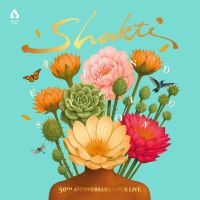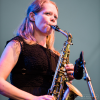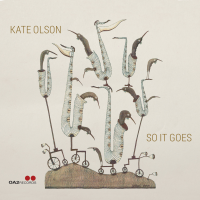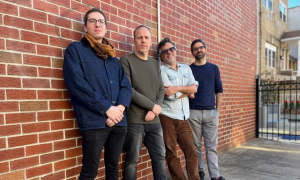Home » Jazz Articles » Inside the Songs » Julian Shore: Sharing Secrets Under The Rose
Julian Shore: Sharing Secrets Under The Rose
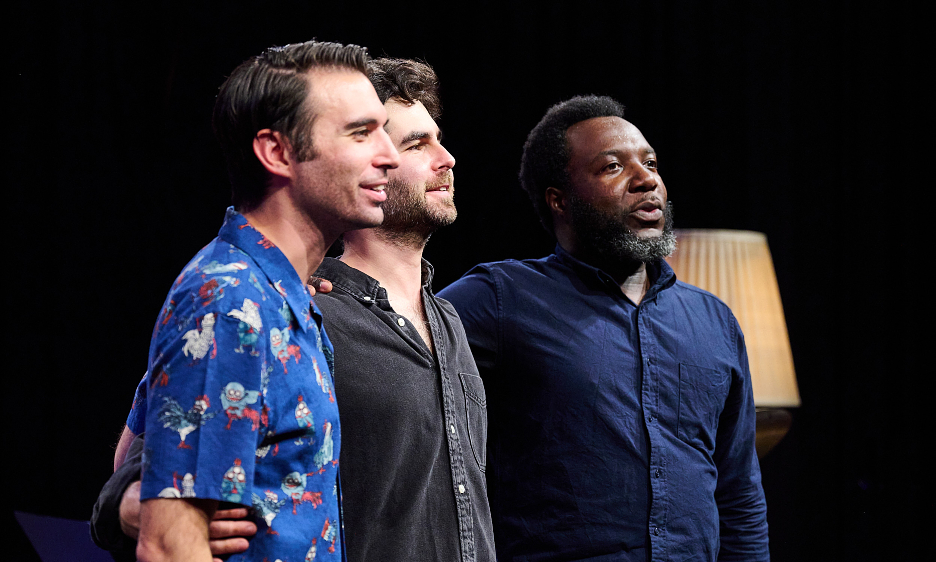
Courtesy Patrick Britschgi
I grew up surrounded by abstraction .... and that's what led me to jazz.
—Julian Shore
You can add Julian Shore to those names above as his trio easily sounds tight and polished but not sterile in the least on Sub Rosa (Chilltone 2025). Shore is undoubtedly the leading voice in this Isosceles triangle of the group; his firm base established where the two equal legs of bassist Martin Nevin and drummer Allan Mednard extend in uniting and diverging turns to dazzling effect. Flowing phrasing is one of the hallmarks of Shore's style, creating space for contemplation in an increasingly noisy world. There is a tenderness and fragility that fits perfectly with idiosyncratic tracks that are filled with emotional depth. Mednard is playing time instead of bashing it, never negligible nor overpowering, while Nevin has a firm grip on the contours that so instinctively decorate Shore's keyboard capers.
The follow-up to their debut album Trio (Tone Rogue Records, 2023) reflects more than two years of camaraderie and evolution since that initial meeting, capturing the remarkable fluidity with which the three bandmates reshape the music in the moment. The material that Shore has penned for them is rooted in personal experience, though the composer hopes that the music speaks for itself. "I hinted at different elements of my life in the titles of the tunes, but I never want to give the whole picture away," Shore said. He points to an oft-quoted interview with David Lynch, in which the late film director laments having to discuss the meanings behind his cryptic narratives. "As soon as you finish a film," he said with a wince, "people want you to talk about it. The film is the talking... It's the whole thing."
The embedded undercurrents of meaning and complex intuitive leaps that imbue the music is also hinted at inscrutably in Sub Rosa's mystifying artwork by Shore's mother, respected visual artist Tayo Heuser. The painting, with the mirrored head of an antelope surrounded by multi-hued geometric forms, contrasts figurative depictions with pure abstractions, leaving it to the viewer to draw their own connections between the disparate elements. "I grew up surrounded by abstraction," Shore explained. "It feels natural to me, and I think that's what led me to jazz in the first place. I love the dance between the literal and the abstract. When a jazz musician interprets a standard, they can turn a simple melody into an explosion of feeling."
For all of its protocol, however, the impromptu does possess a certain spontaneity. Proof of concept for the trio's ability to abstract familiar material is provided by the kaleidoscopic deconstruction of "All the Things You Are," the Jerome Kern composition and a classic jazz standard. "It's an extreme version of the idea of taking a show tune and expressing over it," Shore conveyed. "The song is such a jazz trope; it has become a real blank canvas for decades."
Because of the manner in which Shore combines playfulness with passion, the way he both galvanizes the moment and anticipates the future, his group may constitute a signature salute to the piano trio's ongoing relevance as it continues to age finely, providing a nostalgic capsule of well-crafted anthems for all time. When devotion is enlivened by audacity, and longing refuses to limit itself to conventional expression, well, anything can happen. Come along with us as Julian Shore takes All About Jazz readers for a spin through the ten tracks on Sub Rosa along with a peek at what goes into the cooking.
All About Jazz: The term "sub rosa" is used to convey something done in secrecy or in confidence, often an investigation. How does the title of the album relate to this term?
Julian Shore: This album ended up as a love letter to abstraction. There is a lot of mystery inherent in jazz, and abstract art in general. It is its own secret language with many meanings and translations. I like the idea of artists keeping some of their own secrets under the roses. I want people to discover their own interpretation of this music, and I recognize the irony in doing a thorough written interview about such a project.
AAJ: On a musical or abstract level, do the songs on the album work together in any way, perhaps curated in some way or are they different songs that you happened to be playing at the time of recording?
JS: They're songs that I felt worked well together, and fit our mission as a trio. I'll leave it to the listener to discern exactly how they fit together, but I can certainly say they were curated carefully for this project.
AAJ: How much structural guidance in the songs do you give to the other two musicians?
JS: I say almost nothing to Martin and Allan. They're some of the most brilliant accompanists I've ever worked with, and they have limitless creativity in the parts they come up with. They're true listeners and always have my back, so I never have to tell them what to do really.
AAJ: Where do your compositional ideas come from? Do you hear things or see them so you can compose in your head even when not at the piano?
JS: Most of my ideas come from thinking about something specific and improvising freely at the piano until an idea emerges. Having the musicians in mind is also critical. Occasionally I'll try different things to break out of habits, but that's where I'm most comfortable.
AAJ: Did you need to study harmony to write chord changes or just write them by ear?
JS: This is a pretty deep question! What "study" means is open to interpretation. If you listen to a lot of music and internalize harmonic structures by ear without necessarily subscribing to what common music theory terminology might suggest, that's still study. I've spoken to some great composers who found some gorgeous progressions simply by moving their finger on a guitar without consideration of the individual notes or the structure. Others might find theirs via intense investigation of the harmonic series or the scientific nature of vibration and dissonance, or something. Staying curious and always striving to learn more is essential, but I'll never feel confident enough to define what's "needed."
AAJ: As a leader and composer is learning the history of what came before on your instrument and in the medium important to being authentic?
JS: Another huge question. I think it's all about what you're trying to do. If you want to swing "authentically" you have to learn how it should feel, and deeply investigating how others have done so in the past is a great way to do that. If you're trying to be authentic to yourself, you have to know yourself (a lifetime pursuit), and simply recognizing what you love and what you want to express can span a career. If you find that resonated in those who came before you within the medium, it can help unlock the means of that expression I think.
AAJ: Do you prefer the trio format with piano and rhythm section to bands with other instrumentation. Whether you prefer this or not, what do you find appealing and useful with a trio?
JS: I don't have a preference. They all do different things! Trio is nimble and swift; you can move as a unit really well. Larger ensembles allow for an expanded palette of textures and sounds as well as more input from different voices. It's all about direction.
AAJ: How did you choose the players that are with you on this recording?
JS: Martin and Allan are beautiful musicians and beautiful people (that often goes hand in hand, but not always). They're extraordinarily versatile, and comfortable in so many widely varied musical settings. But they're also humble and open-minded artists that always serve the music in the moment. It's an honor to play with them and it's always a new adventure.
Inside The Songs
All About Jazz asked Julian Shore to take our readers on a tour of his Sub Rosa album song by song. The only criteria was that he should describe the songs and what went into them however he pleased.Messenger
This was an attempt to write a short piece all in one sitting without the help of a piano. I did it on the way to a session and it reminded me a bit of the '60s Jazz Messengers aesthetic so I called it "Messenger."Mission
When Wayne Shorter passed, I heard that one of his parting statements was that he was "excited to get a new body and continue the mission." I was touched by that, and Wayne is one of my heroes, so I wrote this as a bit of a tribute.Must Keep Going
Without getting too deep into specifics, there were periods in my life that were chaotic and relentless. I wanted to capture that feeling of having to persevere through those moments when things just refuse to calm and you have no choice but to continue.Beacon
I've always loved lighthouses and been fascinated by their monolithic nature and the romance of their solitude. This was just a little meditation on that.Blues in Blueprint
Just a beautiful and profound blues by the master Duke Ellington. The orchestration on the original recording is so incredible, and I tried my best to get a tiny bit of that character onto the piano, which was very difficult! I also just love playing the blues.All the Things You Are
Since this album is kind of a reflection on abstraction, I wanted to play with arranging a standard and see how far I could refract it while still having it be playful and fun. Twisting "All The Things" is a long tradition, and I wanted to honor that a bit too.Don't Talk (Put Your Head on My Shoulder)
This is a gorgeous song that I've always been drawn to, but it felt especially poignant as the title suggests the type of non-verbal communication I'm trying to emphasize in this record. Sometimes you don't need to say anything at all.It Was A Dream
I had what's called a "derealization" triggered by an incredibly vivid dream. I was in a state where I wasn't sure what was real and what was the dream, it was very disturbing. But there was something wistful about it too.Winter Song
Winter is a difficult season for my wife and I, as she has health complications that make her high-risk for Covid. While the rest of the world has been able to move on, we often feel left behind, but we fight through it as a team the best we can. This is about those winters.Pegasus (excerpt)
A little snippet from Wayne's (Shorter) masterwork "Pegasus." Just something small to send the listener off with ... leaving some stuff unsaid.Tags
Interview
Julian Shore
dean nardi
Braithwaite & Katz Communications
Kris Davis
Robert Hurst
Jonathan Blake
Sunna Gunnlaug
Þorgrímur Jónsson
Scott McLemore
Bill Charlap
Peter Washington
Kenny Washington
Ethan Iverson
Marta Sanchez
Luther S. Allison
Martin Nevin
Wayne Shorter
duke ellington
Allan Mednard
PREVIOUS / NEXT
Julian Shore Concerts
Support All About Jazz
 All About Jazz has been a pillar of jazz since 1995, championing it as an art form and, more importantly, supporting the musicians who make it. Our enduring commitment has made "AAJ" one of the most culturally important websites of its kind, read by hundreds of thousands of fans, musicians and industry figures every month.
All About Jazz has been a pillar of jazz since 1995, championing it as an art form and, more importantly, supporting the musicians who make it. Our enduring commitment has made "AAJ" one of the most culturally important websites of its kind, read by hundreds of thousands of fans, musicians and industry figures every month.




